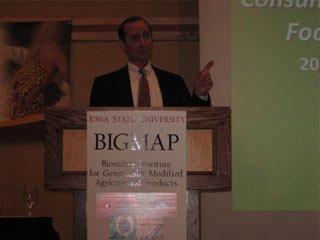Millers Association VP blasts GM food regulations
By Ken Roseboro
Published: June 1, 2011
Category: GM Food Labeling and Regulations

To access all the articles in this month's issue of The Organic & Non-GMO Report, SUBSCRIBE NOW.
Says biotechnology companies should be held liable for contamination problems
Jim Bair, vice president of the North American Millers Association (NAMA), criticized the US government’s regulations of genetically modified crops, saying they had been “cobbled together with bailing wire and duct tape.”
Speaking at a conference at Iowa State University in April, Bair said that while NAMA supported food biotechnology, the association believed that the US regulatory process for approving genetically modified crops was ineffective. “The regulatory system worked okay for herbicide tolerant and insect resistant traits. But is the current system regulating biotech tenable over the long-term?” he asked.
“More nuanced approach” needed
Bair cited lawsuits over GM crop approvals, such as alfalfa and sugar beets, as indications that the current system isn’t working. “The chaos around that is not good for anyone,” he said.
NAMA recently opposed USDA’s approval of a genetically modified corn for ethanol production due to its potential to contaminate corn for food production.
Bair said that a “more nuanced approach” to regulating GM crops is needed, particularly when reviewing crops genetically modified to produce pharmaceuticals.
Bair gave the food industry’s perspective as the “gatekeepers” to the food supply. He mentioned damages suffered by the food industry when StarLink GM corn, which was not approved for food use, contaminated hundreds of food products leading to a massive and costly food recall.
“We had to conduct three (GMO) tests on every truckload of corn for eight years down to the single part per billion level or one corn kernel in 9500 bushels,” Bair said. “Is that a tenable basis for testing traits in the food supply?”
“Shouldn’t be responsible for cleaning the mess”
Bair then discussed solutions that NAMA would like to see implemented. The first is a proper risk assessment of GM crops, which includes making data available on how the crop changes the functionality of grains. Second, there needs to be proper risk management including steps to reduce contamination risks. Bair said a commonly heard reaction after GMO contamination incidents occur is “we never imagined it would happen that way.” “Biological error will never be eliminated,” he said. Finally, there needs to be risk responsibility that biotechnology companies should be responsible for contamination incidents when they happen. “We shouldn’t be responsible for cleaning the mess that may occur,” Bair said.
© Copyright June 2011, The Organic & Non-GMO Report




